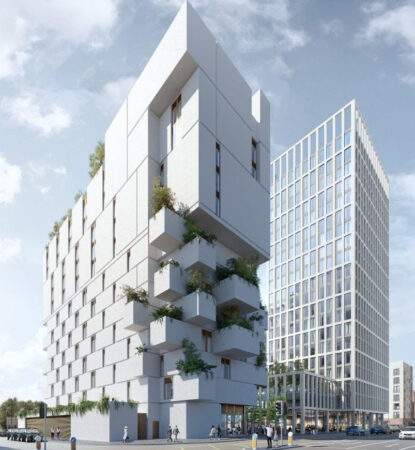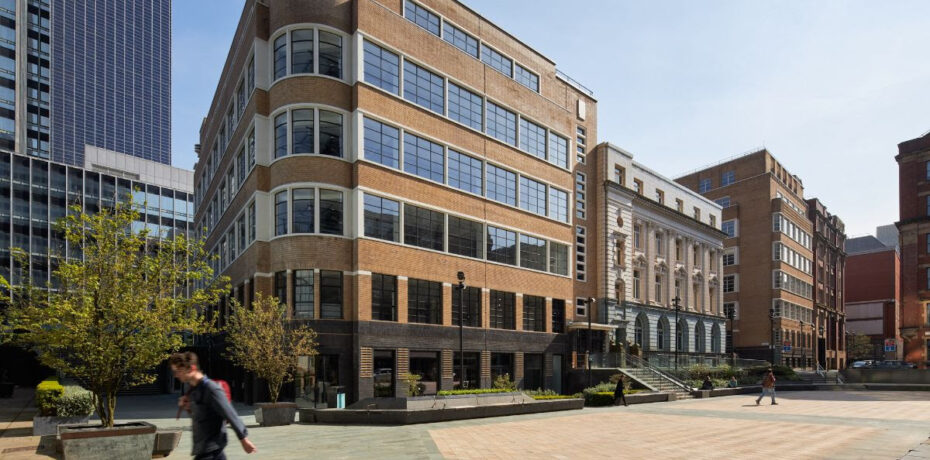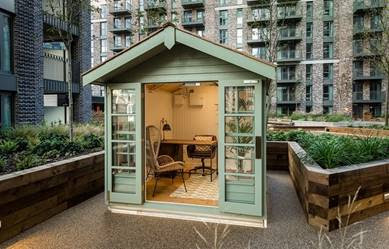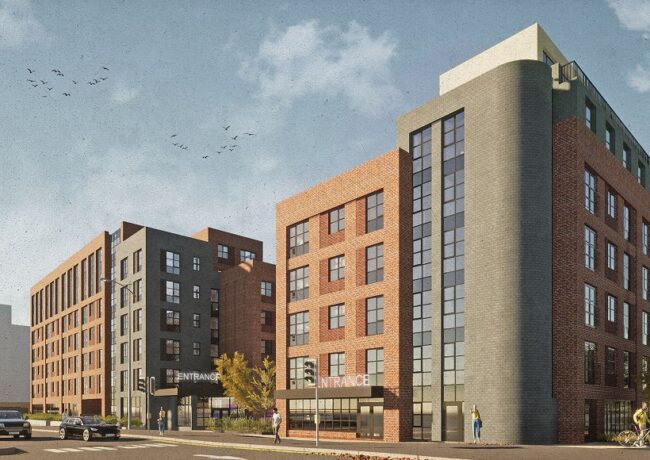The Subplot
The Subplot | Quintain talk, peak hotel, Manchester offices
Welcome to The Subplot, your regular slice of commentary on the North West business and property market from Place North West.
THIS WEEK
- Texas-backed build-to-rent developer Quintain Living hints that a Manchester debut could be approaching
- Has Manchester reached Peak Hotel? Hoteliers and developers think, for now, it probably has
- Office take-up data for the first quarter of 2021 needs careful reading

FIRST TIME AT THE RODEO
Texas-backed BTR giant eyes Manchester
Quintain Living, the Texan-backed big beast of London build-to-rent, has been wary of talking about its Manchester plans. But the mood is changing. Subplot spoke exclusively to chief executive James Saunders.
Quintain Living is probably the BTR sector’s only volume housebuilder. Its 85-acre Wembley Park development already has 2,400 units with another 4,000 still to come as Quintain makes a determined play for family tenants. Backed by US money in the form of Dallas-based mega-investor Lone Star Funds, its arrival in Manchester would be big, big news.
Coming soon
The likely entry route is via its operating platform, allowing Quintain to manage the BTR assets of other owners and investors. “We’re being invited to operate other landlord’s BTR products, so it is possible we may enter the Manchester market as an operator. It is a distinct possibility,” says Saunders. “You need a strong platform to do that and we want clusters of regional activity operating to the same standards as London, and benefiting from economies of scale.”
Tempting
As for regional developments of its own? Saunders is tempted. “We could do Manchester, we like Manchester. The issue is the amount of activity already there. There’s a huge amount in Manchester, a lot of competition for great sites and a lot of great players, so you need well-located affordable land and strong relations with local authorities, if you believe the market isn’t oversaturated.”
Dangers
Does Saunders believe the market is oversaturated? “Hard to say. I would prefer to say there is lots of activity,” he offers. “Our product would have to be modified to meet the regional market, particularly local rental aspirations though in major cities like Manchester the gap with London rents is not that far apart. There’s huge potential in the regional markets.”
Your problem is my opportunity
The big opportunity for Quintain is to team up with landowners that need to repurpose or rethink existing sites: the owners of big shopping centres are particularly anxious to talk, and make an obvious target. Hammerson is already exploring BTR partnerships in a general way. Ex-Intu Properties centres (think Trafford Centre, maybe even the Manchester Arndale) might offer real opportunities for mixed-use-linked BTR.
Arndale knot
Pressed to say if a Manchester shopping centre is in his crosshairs, Saunders turns the question on its head. “Put it the other way around: most sites are too small for us,” he says. “We wouldn’t consider schemes under 500 units, and we need good transport links, and we could make a success of schemes with several thousand units and mixed-use components.”
But not yet
The timetable for full-throated regional expansion is likely to be medium term. “We still have 4,000 units to deliver at Wembley, that will take six or seven years,” says Saunders. Given the need to keep its pipeline moving, wise observers might look at a Quintain debut date around 2024/25.
Fill your boots
Behind the optimism is a tsunami of money. CBRE data show the BTR sector had a stellar first quarter of 2021, chalking up investment deals totalling £770m, with another £1.5bn in the pipeline. Yes, the figure is down on Q4 2020, but it is still the second highest yet as the fledgling sector progresses towards becoming a mainstream asset class.
Conclusion: Quintain is among many waiting for the right moment to break into the Manchester market. That moment is getting closer.
DRIVING THE WEEK
 Manchester hotels’ best-before date
Manchester hotels’ best-before date
Big announcements are just weeks away about Starwood Capital and Property Alliance Group’s £200m plans for the Manchester Renaissance hotel site. The city’s fast-growing hotel sector was put in the deep freeze 13 months ago. In three weeks’ time it begins to defrost, as lockdown easing opens up the hospitality sector. Will developers discover a once solid bet has turned mushy?
Very soon Starwood/PAG joint venture will announce the final shape of its plans to redevelop the Renaissance hotel site at the end of Deansgate. A £25m refurbishment of the 206-bed venue is anticipated, and it comes at a tricky time.
All change
Before March 2020, the hotel sector was the developers’ darling: it offered fairly secure income, pleased the planners, provided animation and placemaking. Best of all, operators were expanding like mad and investors were filling their boots (so both push and pull demand). A year later, a mix of looming oversupply of hotel beds, fragile hotel viability and a long-term change in the way developers work out the maths of hotel development, mean that Greater Manchester’s hotel sector has probably peaked.
Tap still running
The development pipeline may have been turned off, but pre-pandemic decisions mean there is still a vast surge of new hotel beds working its way towards us. Between 2021 and 2026 Manchester city centre will see the supply of hotel rooms grow by a staggering 38% (up 4,155 on today’s 11,000, according to Marketing Manchester). Greater Manchester figures move on the same upward curve. This year alone could see 1,010 new city centre rooms, say Marketing Manchester. That is a 10% boost to supply, at a time when nobody is sure how much of a hotel market is left.
Hoteliers unhappy
Hoteliers, reeling from the pandemic, already expected to face a year or two of disruption. Occupancy rates of 35-40% are probably the best they can hope for this summer, and it will barely pay the bills. No wonder they look on a surge in supply with undisguised alarm. The assumption is of a bumpy three to five years, they say, as the winners scoop up the trade and the losers go out of business.
Catch-up
By 2025-ish the hoteliers hope that demand will have recovered sufficiently to keep everyone in business. However, this depends on a prompt return of the business/event/conference trade this autumn, without which some hotels just won’t last long enough. It also depends on a big bounce-back in international trade (because hopes for Manchester staycation traffic are limited). Adrian Ellis, manager of The Lowry in Salford and chair of the Manchester Hoteliers Association, says: “International tourism is the component that’s been missing in Manchester since before the pandemic. It’s just 13-15% of visits, which is a long way behind. We need the seriously international events and the multi-lingual infrastructure to support them.”
Appraisal issues
While hoteliers grumble, developers do their maths. Tom McWilliams is development director at PAG, and is now shepherding the Renaissance plan along with four other hotel and aparthotel schemes adding up to 900 beds. “There will be short-term disruption, and causalities, and we may see some natural wastage of hotels that need to revamp and reposition,” he says of hoteliers’ current plight. But developers are also having to rethink plans. “Pre-Covid I could probably go to seven, eight, nine operators that would sign a long-term lease, and then to six, seven, eight forward-funders that would back the development, which means security for developers. Hotels become attractive and deliverable. Today none of that is true,” says McWilliams.
Well-endowed friends
Without deep-pocketed and patient backers like Starwood, hotel development does not work. This is because investors dislike the only other route on offer, which is the management agreements and turnover-related deals most operators now offer: these approaches offer no security of income. “Today the hotel sector is a different world,” says McWilliams. He predicts more developers will opt for refurbishment or redevelopment, not least because it gets hotel beds into the market quicker, with (usually) lower upfront capital expenditure. Why build when you could take over an existing hotel, then reposition it? If the hoteliers are right, several of these kinds of opportunities will soon become available.
Patience
Always a virtue, and in hotel development now also a necessity. “I’ve no doubt the market will come back,” says Adam Higgins, co-founder of Capital & Centric, developer behind the 275-bed Jenga-themed hotel at Adair Street (pictured above). “I’d rather be a hotel developer than an office developer, because while there are real questions about office viability in the future, I don’t think we’ll see fundamental changes to social patterns like hotel use.” The widespread belief is that, despite the looming supply surge, Manchester can cope with more, particularly at the top end. And if more competition forces the older, more tired, hotels to up their game or free up sites for alternative use, so much the better.
Conclusion: an unstable, unpredictable few years lie ahead, which might turn out to be a good thing.
IN CASE YOU MISSED IT…
Talking up the market
Manchester’s Q1 2021 office take-up figures look disappointing, down 33% on the previous quarter and 23% year-on-year. Yet, for once, agents’ habitual sunny-side-up interpretation is not misplaced.
In the first quarter of 2021, Manchester’s combined office markets managed to secure deals totalling 394,000 sq ft. Of this 234,357 sq ft was let in the city centre, down from 349,513 sq ft in the fourth quarter of 2020. That amounts to an almighty, stomach-churning plunge of 33%. Manchester Office Agents Forum, which produced the figures, called the Q1 figure “slightly below” that for Q4, which suggests a puppyish determination to emphasise the positive that makes you want to pat their heads. MOAF’s statement went on to declare the figures “continued the general recovery” and on this the agents were on stronger ground.
The narrow view
A pandemic means the usual historic year-on-year comparisons are pretty much a waste of time. To see why the agents are right you need to look more narrowly and more widely. First, let’s go narrow, focusing on 2020 alone, and remembering the context, which is that Q4 2020 was the only quarter of the year to follow a lockdown-free quarter. So time for deals to get done. No wonder city centre take-up shot up, recovering from near-death experiences in Q2 2020 (75,995 sq ft) and Q3 2020 (69,106 sq ft). Now turn to Q1 2021, which began under lockdown and ended during lockdown and might have been expected to see take-up dip down to the dire levels of last year. But it didn’t. That resilience is worth noting.
The wider view
Now let’s try the wider view by including in our calculations the southern business parks and Salford Quays and Old Trafford. This matters because out-of-town is said to have enjoyed improved appeal to Covid-cautious occupiers that fancied space and fresh air and their own front door. South Manchester’s take-up picked up nicely from Q2 2020 (the quarterly sequence goes: 60,000 sq ft, 40,000 sq ft, 93,000 sq ft, 95,000 sq ft by Q1 2021), as did Salford Quays (77,000 sq ft, 45,000 sq ft, 52,000 sq ft, ending with 67,000 sq ft by Q1 2021). Both show nice upward trends.
Put that another way
In other words, we had a pandemic. It shook confidence in all markets, but it shook confidence more severely in the city centre, and so the market there is recovering more slowly.
The Subplot is brought to you in association with Cratus, Bruntwood Works, Savills and Morgan Sindall.






